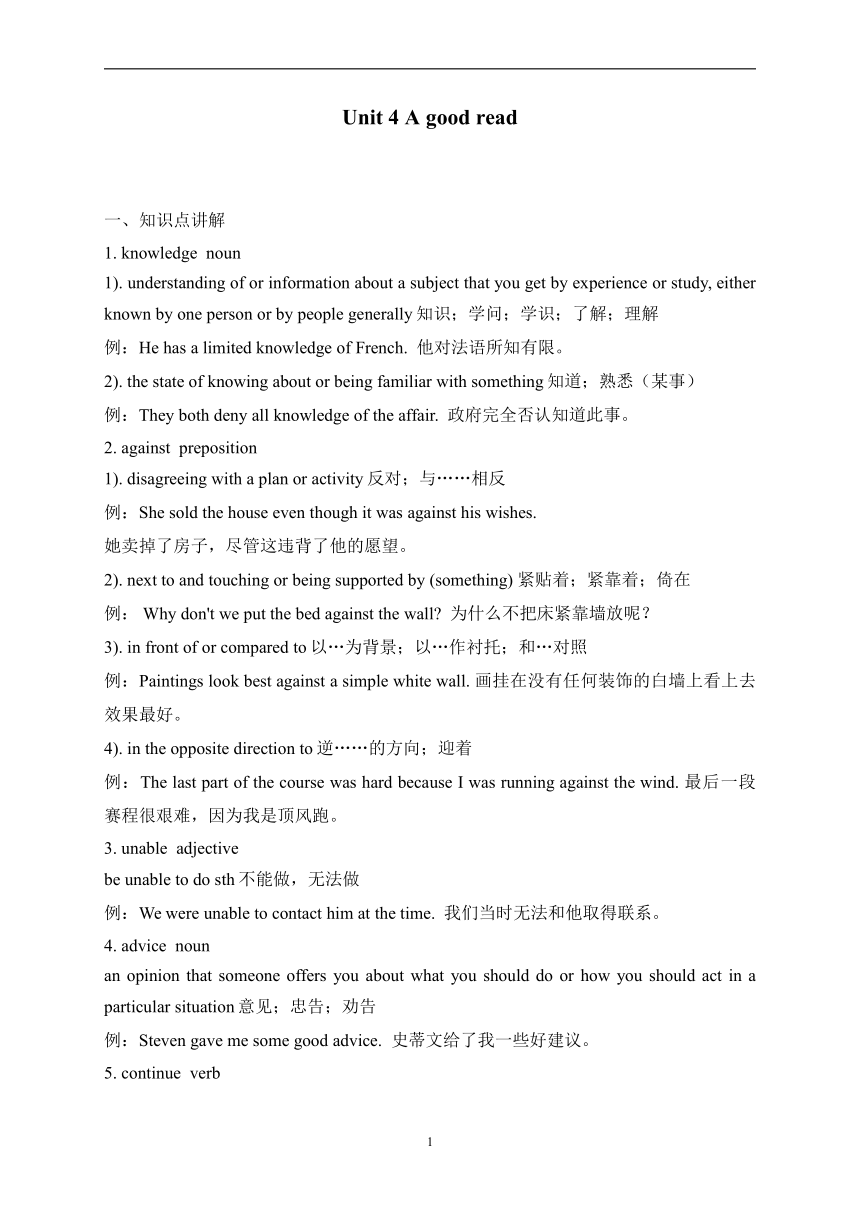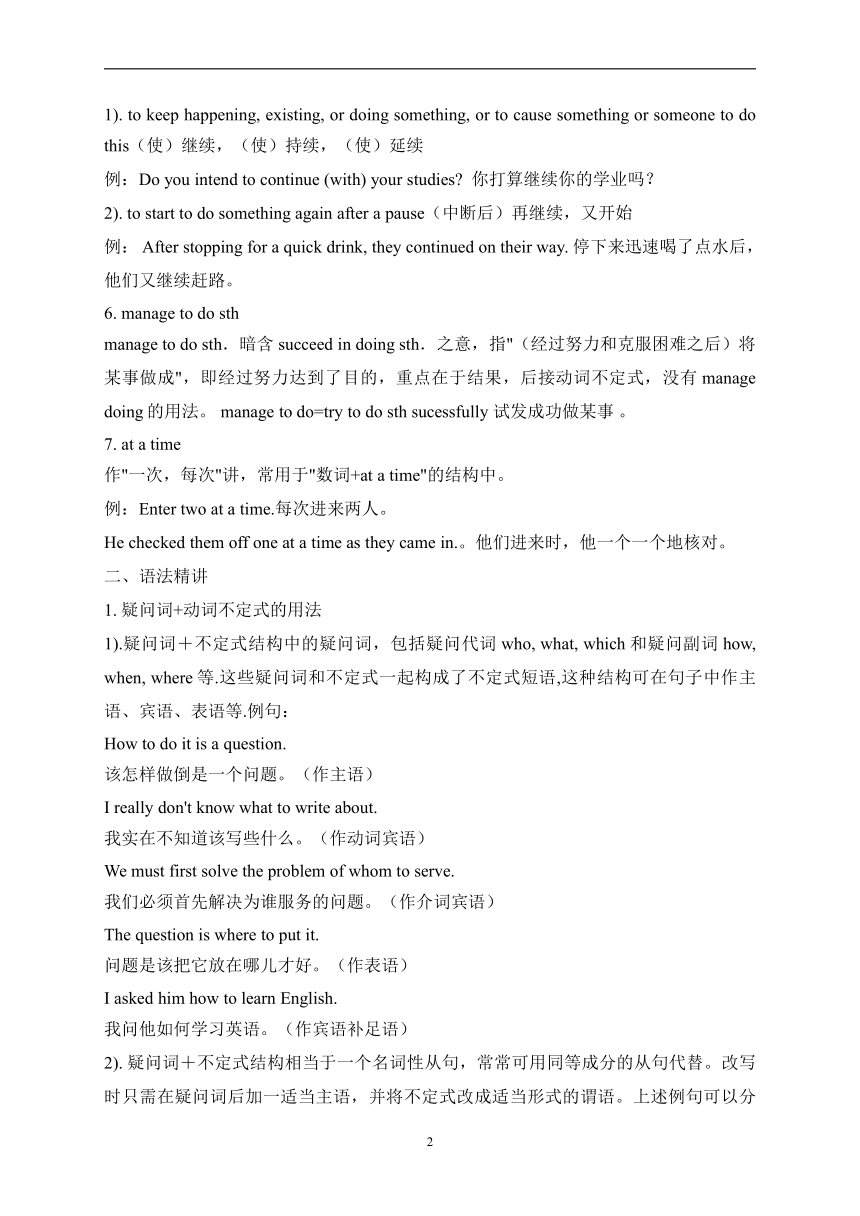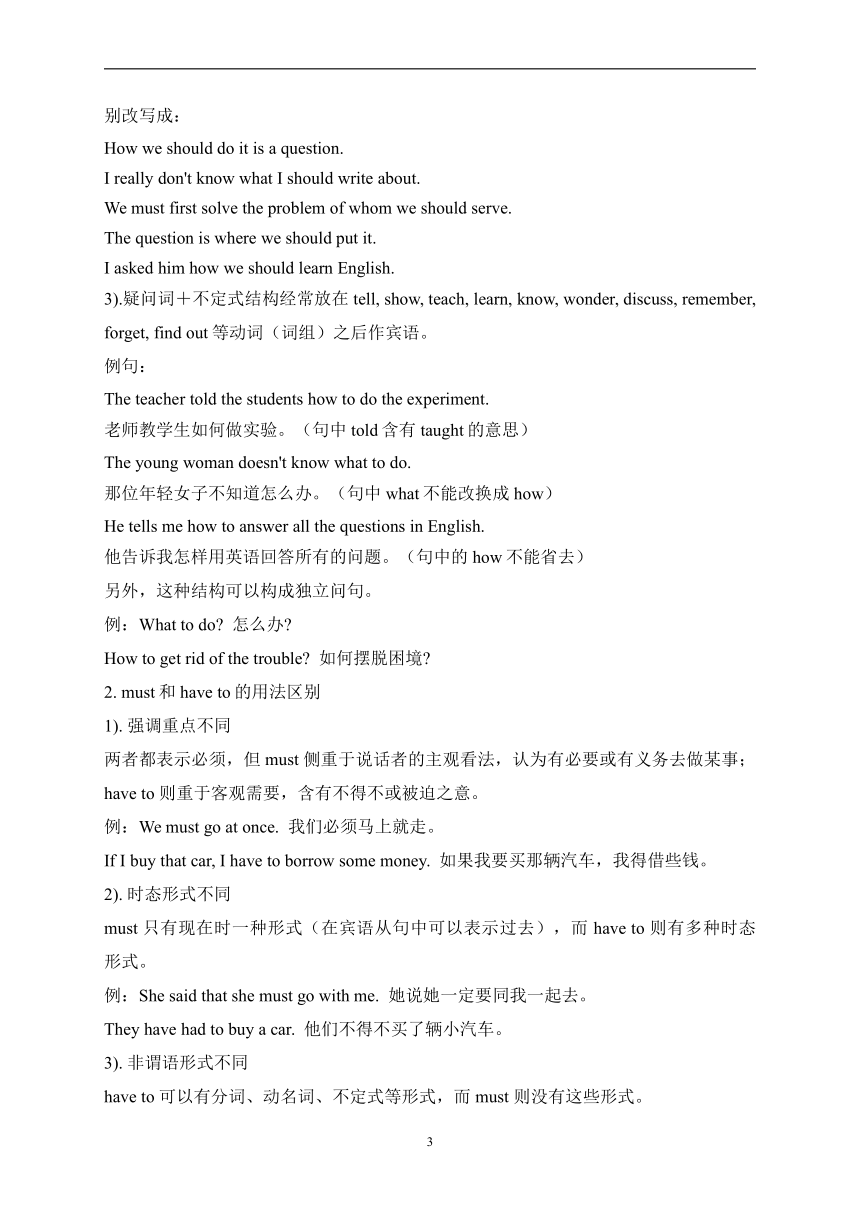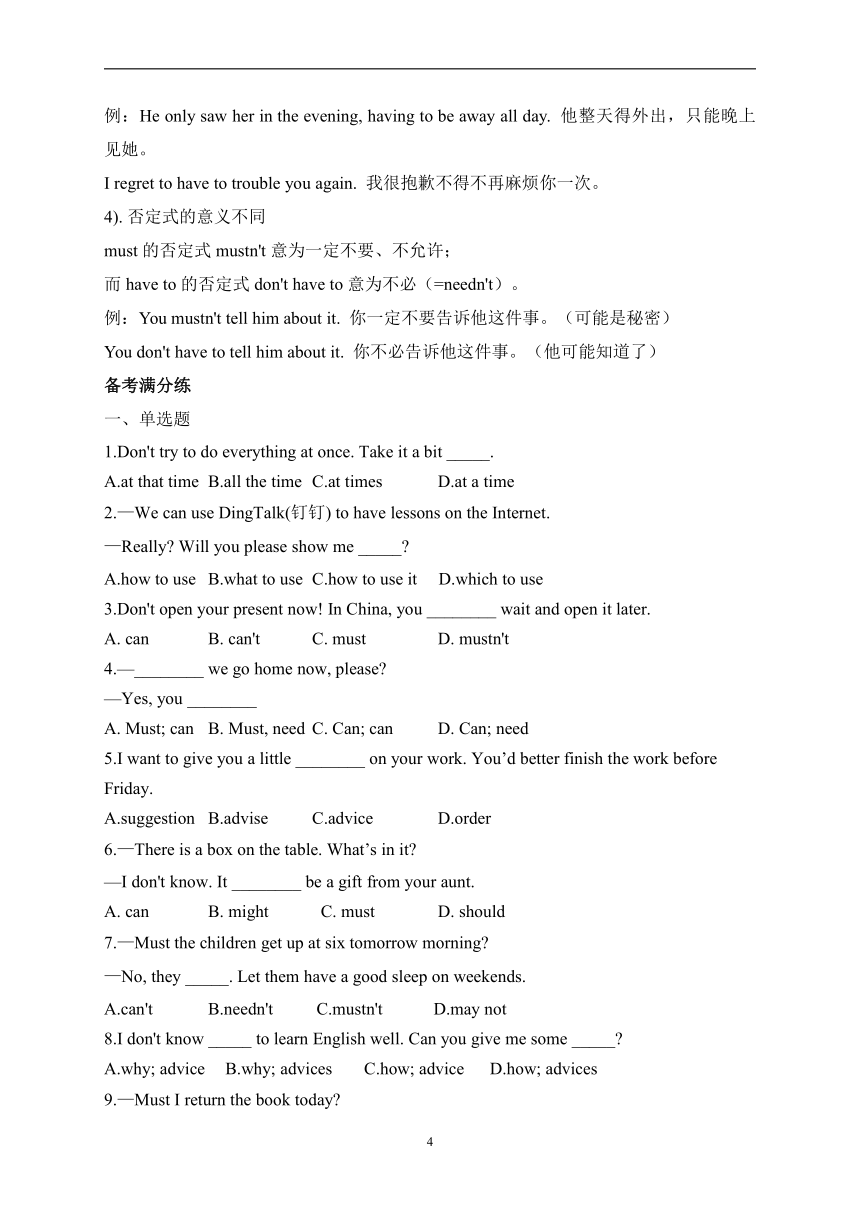Unit 4 A good read——2022-2023学年牛津译林版英语八年级下学期期末复习备考攻略(含解析)
文档属性
| 名称 | Unit 4 A good read——2022-2023学年牛津译林版英语八年级下学期期末复习备考攻略(含解析) |  | |
| 格式 | docx | ||
| 文件大小 | 31.6KB | ||
| 资源类型 | 教案 | ||
| 版本资源 | 牛津译林版 | ||
| 科目 | 英语 | ||
| 更新时间 | 2023-06-18 16:20:11 | ||
图片预览




文档简介
Unit 4 A good read
一、知识点讲解
1. knowledge noun
1). understanding of or information about a subject that you get by experience or study, either known by one person or by people generally知识;学问;学识;了解;理解
例:He has a limited knowledge of French. 他对法语所知有限。
2). the state of knowing about or being familiar with something知道;熟悉(某事)
例:They both deny all knowledge of the affair. 政府完全否认知道此事。
2. against preposition
1). disagreeing with a plan or activity反对;与……相反
例:She sold the house even though it was against his wishes.
她卖掉了房子,尽管这违背了他的愿望。
2). next to and touching or being supported by (something) 紧贴着;紧靠着;倚在
例: Why don't we put the bed against the wall 为什么不把床紧靠墙放呢?
3). in front of or compared to以…为背景;以…作衬托;和…对照
例:Paintings look best against a simple white wall. 画挂在没有任何装饰的白墙上看上去效果最好。
4). in the opposite direction to逆……的方向;迎着
例:The last part of the course was hard because I was running against the wind. 最后一段赛程很艰难,因为我是顶风跑。
3. unable adjective
be unable to do sth不能做,无法做
例:We were unable to contact him at the time. 我们当时无法和他取得联系。
4. advice noun
an opinion that someone offers you about what you should do or how you should act in a particular situation意见;忠告;劝告
例:Steven gave me some good advice. 史蒂文给了我一些好建议。
5. continue verb
1). to keep happening, existing, or doing something, or to cause something or someone to do this(使)继续,(使)持续,(使)延续
例:Do you intend to continue (with) your studies 你打算继续你的学业吗?
2). to start to do something again after a pause(中断后)再继续,又开始
例: After stopping for a quick drink, they continued on their way. 停下来迅速喝了点水后,他们又继续赶路。
6. manage to do sth
manage to do sth.暗含succeed in doing sth.之意,指"(经过努力和克服困难之后)将某事做成",即经过努力达到了目的,重点在于结果,后接动词不定式,没有manage doing的用法。 manage to do=try to do sth sucessfully 试发成功做某事 。
7. at a time
作"一次,每次"讲,常用于"数词+at a time"的结构中。
例:Enter two at a time.每次进来两人。
He checked them off one at a time as they came in.。他们进来时,他一个一个地核对。
二、语法精讲
1. 疑问词+动词不定式的用法
1).疑问词+不定式结构中的疑问词,包括疑问代词who, what, which和疑问副词how, when, where等.这些疑问词和不定式一起构成了不定式短语,这种结构可在句子中作主语、宾语、表语等.例句:
How to do it is a question.
该怎样做倒是一个问题。(作主语)
I really don't know what to write about.
我实在不知道该写些什么。(作动词宾语)
We must first solve the problem of whom to serve.
我们必须首先解决为谁服务的问题。(作介词宾语)
The question is where to put it.
问题是该把它放在哪儿才好。(作表语)
I asked him how to learn English.
我问他如何学习英语。(作宾语补足语)
2). 疑问词+不定式结构相当于一个名词性从句,常常可用同等成分的从句代替。改写时只需在疑问词后加一适当主语,并将不定式改成适当形式的谓语。上述例句可以分别改写成:
How we should do it is a question.
I really don't know what I should write about.
We must first solve the problem of whom we should serve.
The question is where we should put it.
I asked him how we should learn English.
3).疑问词+不定式结构经常放在tell, show, teach, learn, know, wonder, discuss, remember, forget, find out等动词(词组)之后作宾语。
例句:
The teacher told the students how to do the experiment.
老师教学生如何做实验。(句中 told含有taught的意思)
The young woman doesn't know what to do.
那位年轻女子不知道怎么办。(句中what不能改换成how)
He tells me how to answer all the questions in English.
他告诉我怎样用英语回答所有的问题。(句中的how不能省去)
另外,这种结构可以构成独立问句。
例:What to do 怎么办
How to get rid of the trouble 如何摆脱困境
2. must和have to的用法区别
1). 强调重点不同
两者都表示必须,但must 侧重于说话者的主观看法,认为有必要或有义务去做某事;have to 则重于客观需要,含有不得不或被迫之意。
例:We must go at once. 我们必须马上就走。
If I buy that car, I have to borrow some money. 如果我要买那辆汽车,我得借些钱。
2). 时态形式不同
must 只有现在时一种形式(在宾语从句中可以表示过去),而 have to 则有多种时态形式。
例:She said that she must go with me. 她说她一定要同我一起去。
They have had to buy a car. 他们不得不买了辆小汽车。
3). 非谓语形式不同
have to 可以有分词、动名词、不定式等形式,而 must 则没有这些形式。
例:He only saw her in the evening, having to be away all day. 他整天得外出,只能晚上见她。
I regret to have to trouble you again. 我很抱歉不得不再麻烦你一次。
4). 否定式的意义不同
must 的否定式 mustn't 意为一定不要、不允许;
而 have to 的否定式 don't have to 意为不必(=needn't)。
例:You mustn't tell him about it. 你一定不要告诉他这件事。(可能是秘密)
You don't have to tell him about it. 你不必告诉他这件事。(他可能知道了)
备考满分练
一、单选题
1.Don't try to do everything at once. Take it a bit _____.
A.at that time B.all the time C.at times D.at a time
2.—We can use DingTalk(钉钉) to have lessons on the Internet.
—Really Will you please show me _____
A.how to use B.what to use C.how to use it D.which to use
3.Don't open your present now! In China, you ________ wait and open it later.
A. can B. can't C. must D. mustn't
4.—________ we go home now, please
—Yes, you ________
A. Must; can B. Must, need C. Can; can D. Can; need
5.I want to give you a little ________ on your work. You’d better finish the work before Friday.
A.suggestion B.advise C.advice D.order
6.—There is a box on the table. What’s in it
—I don't know. It ________ be a gift from your aunt.
A. can B. might C. must D. should
7.—Must the children get up at six tomorrow morning
—No, they _____. Let them have a good sleep on weekends.
A.can't B.needn't C.mustn't D.may not
8.I don't know _____ to learn English well. Can you give me some _____
A.why; advice B.why; advices C.how; advice D.how; advices
9.—Must I return the book today
—No, you _____.
A.don't B.mustn't C.don't have to D.can't
10.We are going for a picnic tomorrow. I'll call Wendy to make sure _____.
A.why to start B.when to star C.what to start D.which to start
二、填空题
11.Liu Cixin is a great ________. I love reading his books. (write)
12.Could you please give me some ________ (建议) on how to improve my English
13.I'm sorry that I can't speak any _________ (法语).
14.He gets up early and exercises every day. It's a good h_____.
15.We must _____(try) our best to read more good books.
三、阅读理解
Long ago, a huge man lived in a wide area. He ate delicious fruit and vegetables from his garden (花园) . At night, he played sad songs on a huge violin. He owned all that everyone hoped to have. However, he had no friends and he wasn't happy.
The huge man knew that people was afraid of seeing what he looked like. Though he was kind, sometimes what he did made people scared. Once, he visited 2 town. Because he was careless, he hit a cart (推车) full of water barrels (桶) . The town’s people ran away in a hurry.
One summer, it rained heavily for three days. All the rivers were full of water and the water began running. At night, a dam (水坝) broke. The huge man saw a wall of water rush towards (冲向) the sleeping town. He picked up his violin and played as loudly as he could. The music woke up the sleeping people. All of them ran to the safe place quickly.
The next day, all the people in the town thanked the huge man. He suddenly had more friends than he could count. From that day, people heard only beautiful music from the huge man’s violin.
16.How did the huge man feel though he owned all
A. Bored. B. Unhappy. C. Friendly. D. Worried.
17.Why did the huge man suddenly have more friends
A. He repaired the broken dam.
B. He could play the violin well.
C. He saved people’s lives in time.
D. He gave away money to poor people.
18.Which is the right order of the following events
①It rained heavily for three days.
②The music woke up the sleeping people.
③The huge man played sad songs on a violin.
④The huge man hit a cart full of water barrels.
A. ①③④② B. ③④①② C. ④①③② D. ③②④①
答案以及解析
1.答案:D
解析:考查短语辨析。句意: 不要试图同时做所有的事情。一次做一点。at that time在那时; all the time总是; at times有时; at a time—次。故选D。
2.答案:C
解析:考察疑问副词。句意: —我们可以用钉钉上网课了。—真的吗 你能让我看看怎么用它吗? 根据句意可知,选疑问词how, 因为use为及物动词, 要有宾语, 所以要加it。故选C。
3.答案:C
解析:考查动词辨析和常识。句意:现在不要打开你的礼物!在中国,您必须等待并稍后打开它。can能够;can't不能;must必须;mustn't禁止。根据"and open it later."和常识可知,在中国拿到礼物,必须等待再稍后打开礼物。故选C。
4.答案:C
解析:考查情态动词。句意:—请问我们现在可以回家了吗?—是的,你可以。Must必须,以must开头的一般疑问句,肯定回答用must结尾,排除AB选项;need需要;can可以,以can开头的一般疑问句,肯定回答用can结尾,排除D选项。故选C。
5.答案:C
解析:考查名词辨析。句意:我想就你的工作给你一点建议。你最好在星期五之前完成这项工作。suggestion建议,可数名词;advise建议, 动词;advice建议, 不可数名词; order指示,命令,可数名词。根据"...give you a little"可知,此处用不可数名词advice符合。故选C。
6.答案:B
解析:考查情态动词辨析。句意:——在桌子上有一个盒子。什么在里面?——我不知道。它可能是来自你姑姑的一个礼物。can能够;might可能;must一定;should应该。根据"I don't know"以及"It … be a gift from your aunt"可知,此处是推测可能是来自姑姑的礼物。故选B。
7.答案:B
解析:考查情态动词词义辨析。句意: —孩子们明天早上必须六点钟起床吗 —不, 他们不必。让他们在周末睡个好觉吧。由情态动词must构成的一般疑问句, 其否定回答为"No, 主语+needn't"。故选B。
8.答案:C
解析:考查特殊疑问词和名词。句意: 我不知道如何学好英语。你能给我一些建议吗 advice"建议"是不可数名词, 没有复数形式, 故B和D错误。why为什么; how怎样, 如何。结合句意可知,第一个空填how。故选C。
9.答案:C
解析:考查情态动词。句意: —我必须今天归还这本书吗 —不, 你不必。don't不; mustn't禁止, 不要; don't have to不必, 没有必要; can't不能, 不可能。"Must... "结构的一般疑问句的肯定回答用must, 否定回答用needn't或者don't have to。 故选C。
10.答案:B
解析:考察疑问副词。句意:我们明天将要去野餐。我将打电话给Wendy确定什么时候出发。why为什么; when什么时候; what什么; which哪个。由"We are going for a picnic tomorrow."可知这里要说的是"确定什么时候开始"。故选B。
二、填空题
11.答案:writer
12.答案:advice/suggestions
13.答案:French
14.答案:habit
15.答案:try
三、阅读理解
16.答案:B
解析:细节理解题。根据"He owned all that everyone hoped to have. However, he had no friends and he wasn't happy."可知,他拥有每个人都希望拥有的一切,然而,他没有朋友,也不开心,所以这位身材魁梧的人虽然拥有一切,但他感觉不开心。故选B。
17.答案:C
解析:推理判断题。根据"He picked up his violin and played as loudly as he could. The music woke up the sleeping people. All of them ran to the safe place quickly."和"The next day, all the people in the town thanked the huge man. He suddenly had more friends than he could count."可知,他拿起小提琴尽可能大声地演奏,音乐把睡着的人吵醒了,他们所有人都迅速跑到了安全的地方。第二天,镇上所有的人都感谢这位身材魁梧的人。他突然有了数不清的朋友。所以可推断出巨人突然有了更多的朋友是因为他及时挽救了人们的生命。故选C。
18.答案:B
解析:细节理解题。根据第一段中"At night, he played sad songs on a huge violin."第二段中"Because he was careless, he hit a cart (推车) full of water barrels (桶) ."第三段中“One summer, it rained heavily for three days."和"The music woke up the sleeping people."可知,文章先叙述晚上,他用一把巨大的小提琴演奏悲伤的歌曲,然后叙述了因为他不小心撞了一辆装满水桶的车,最后叙述了一个夏天,雨下了三天,他让音乐吵醒人们并挽救了人们生命的故事。所以事件的正确顺序应是:③④①②。故选B。
2
一、知识点讲解
1. knowledge noun
1). understanding of or information about a subject that you get by experience or study, either known by one person or by people generally知识;学问;学识;了解;理解
例:He has a limited knowledge of French. 他对法语所知有限。
2). the state of knowing about or being familiar with something知道;熟悉(某事)
例:They both deny all knowledge of the affair. 政府完全否认知道此事。
2. against preposition
1). disagreeing with a plan or activity反对;与……相反
例:She sold the house even though it was against his wishes.
她卖掉了房子,尽管这违背了他的愿望。
2). next to and touching or being supported by (something) 紧贴着;紧靠着;倚在
例: Why don't we put the bed against the wall 为什么不把床紧靠墙放呢?
3). in front of or compared to以…为背景;以…作衬托;和…对照
例:Paintings look best against a simple white wall. 画挂在没有任何装饰的白墙上看上去效果最好。
4). in the opposite direction to逆……的方向;迎着
例:The last part of the course was hard because I was running against the wind. 最后一段赛程很艰难,因为我是顶风跑。
3. unable adjective
be unable to do sth不能做,无法做
例:We were unable to contact him at the time. 我们当时无法和他取得联系。
4. advice noun
an opinion that someone offers you about what you should do or how you should act in a particular situation意见;忠告;劝告
例:Steven gave me some good advice. 史蒂文给了我一些好建议。
5. continue verb
1). to keep happening, existing, or doing something, or to cause something or someone to do this(使)继续,(使)持续,(使)延续
例:Do you intend to continue (with) your studies 你打算继续你的学业吗?
2). to start to do something again after a pause(中断后)再继续,又开始
例: After stopping for a quick drink, they continued on their way. 停下来迅速喝了点水后,他们又继续赶路。
6. manage to do sth
manage to do sth.暗含succeed in doing sth.之意,指"(经过努力和克服困难之后)将某事做成",即经过努力达到了目的,重点在于结果,后接动词不定式,没有manage doing的用法。 manage to do=try to do sth sucessfully 试发成功做某事 。
7. at a time
作"一次,每次"讲,常用于"数词+at a time"的结构中。
例:Enter two at a time.每次进来两人。
He checked them off one at a time as they came in.。他们进来时,他一个一个地核对。
二、语法精讲
1. 疑问词+动词不定式的用法
1).疑问词+不定式结构中的疑问词,包括疑问代词who, what, which和疑问副词how, when, where等.这些疑问词和不定式一起构成了不定式短语,这种结构可在句子中作主语、宾语、表语等.例句:
How to do it is a question.
该怎样做倒是一个问题。(作主语)
I really don't know what to write about.
我实在不知道该写些什么。(作动词宾语)
We must first solve the problem of whom to serve.
我们必须首先解决为谁服务的问题。(作介词宾语)
The question is where to put it.
问题是该把它放在哪儿才好。(作表语)
I asked him how to learn English.
我问他如何学习英语。(作宾语补足语)
2). 疑问词+不定式结构相当于一个名词性从句,常常可用同等成分的从句代替。改写时只需在疑问词后加一适当主语,并将不定式改成适当形式的谓语。上述例句可以分别改写成:
How we should do it is a question.
I really don't know what I should write about.
We must first solve the problem of whom we should serve.
The question is where we should put it.
I asked him how we should learn English.
3).疑问词+不定式结构经常放在tell, show, teach, learn, know, wonder, discuss, remember, forget, find out等动词(词组)之后作宾语。
例句:
The teacher told the students how to do the experiment.
老师教学生如何做实验。(句中 told含有taught的意思)
The young woman doesn't know what to do.
那位年轻女子不知道怎么办。(句中what不能改换成how)
He tells me how to answer all the questions in English.
他告诉我怎样用英语回答所有的问题。(句中的how不能省去)
另外,这种结构可以构成独立问句。
例:What to do 怎么办
How to get rid of the trouble 如何摆脱困境
2. must和have to的用法区别
1). 强调重点不同
两者都表示必须,但must 侧重于说话者的主观看法,认为有必要或有义务去做某事;have to 则重于客观需要,含有不得不或被迫之意。
例:We must go at once. 我们必须马上就走。
If I buy that car, I have to borrow some money. 如果我要买那辆汽车,我得借些钱。
2). 时态形式不同
must 只有现在时一种形式(在宾语从句中可以表示过去),而 have to 则有多种时态形式。
例:She said that she must go with me. 她说她一定要同我一起去。
They have had to buy a car. 他们不得不买了辆小汽车。
3). 非谓语形式不同
have to 可以有分词、动名词、不定式等形式,而 must 则没有这些形式。
例:He only saw her in the evening, having to be away all day. 他整天得外出,只能晚上见她。
I regret to have to trouble you again. 我很抱歉不得不再麻烦你一次。
4). 否定式的意义不同
must 的否定式 mustn't 意为一定不要、不允许;
而 have to 的否定式 don't have to 意为不必(=needn't)。
例:You mustn't tell him about it. 你一定不要告诉他这件事。(可能是秘密)
You don't have to tell him about it. 你不必告诉他这件事。(他可能知道了)
备考满分练
一、单选题
1.Don't try to do everything at once. Take it a bit _____.
A.at that time B.all the time C.at times D.at a time
2.—We can use DingTalk(钉钉) to have lessons on the Internet.
—Really Will you please show me _____
A.how to use B.what to use C.how to use it D.which to use
3.Don't open your present now! In China, you ________ wait and open it later.
A. can B. can't C. must D. mustn't
4.—________ we go home now, please
—Yes, you ________
A. Must; can B. Must, need C. Can; can D. Can; need
5.I want to give you a little ________ on your work. You’d better finish the work before Friday.
A.suggestion B.advise C.advice D.order
6.—There is a box on the table. What’s in it
—I don't know. It ________ be a gift from your aunt.
A. can B. might C. must D. should
7.—Must the children get up at six tomorrow morning
—No, they _____. Let them have a good sleep on weekends.
A.can't B.needn't C.mustn't D.may not
8.I don't know _____ to learn English well. Can you give me some _____
A.why; advice B.why; advices C.how; advice D.how; advices
9.—Must I return the book today
—No, you _____.
A.don't B.mustn't C.don't have to D.can't
10.We are going for a picnic tomorrow. I'll call Wendy to make sure _____.
A.why to start B.when to star C.what to start D.which to start
二、填空题
11.Liu Cixin is a great ________. I love reading his books. (write)
12.Could you please give me some ________ (建议) on how to improve my English
13.I'm sorry that I can't speak any _________ (法语).
14.He gets up early and exercises every day. It's a good h_____.
15.We must _____(try) our best to read more good books.
三、阅读理解
Long ago, a huge man lived in a wide area. He ate delicious fruit and vegetables from his garden (花园) . At night, he played sad songs on a huge violin. He owned all that everyone hoped to have. However, he had no friends and he wasn't happy.
The huge man knew that people was afraid of seeing what he looked like. Though he was kind, sometimes what he did made people scared. Once, he visited 2 town. Because he was careless, he hit a cart (推车) full of water barrels (桶) . The town’s people ran away in a hurry.
One summer, it rained heavily for three days. All the rivers were full of water and the water began running. At night, a dam (水坝) broke. The huge man saw a wall of water rush towards (冲向) the sleeping town. He picked up his violin and played as loudly as he could. The music woke up the sleeping people. All of them ran to the safe place quickly.
The next day, all the people in the town thanked the huge man. He suddenly had more friends than he could count. From that day, people heard only beautiful music from the huge man’s violin.
16.How did the huge man feel though he owned all
A. Bored. B. Unhappy. C. Friendly. D. Worried.
17.Why did the huge man suddenly have more friends
A. He repaired the broken dam.
B. He could play the violin well.
C. He saved people’s lives in time.
D. He gave away money to poor people.
18.Which is the right order of the following events
①It rained heavily for three days.
②The music woke up the sleeping people.
③The huge man played sad songs on a violin.
④The huge man hit a cart full of water barrels.
A. ①③④② B. ③④①② C. ④①③② D. ③②④①
答案以及解析
1.答案:D
解析:考查短语辨析。句意: 不要试图同时做所有的事情。一次做一点。at that time在那时; all the time总是; at times有时; at a time—次。故选D。
2.答案:C
解析:考察疑问副词。句意: —我们可以用钉钉上网课了。—真的吗 你能让我看看怎么用它吗? 根据句意可知,选疑问词how, 因为use为及物动词, 要有宾语, 所以要加it。故选C。
3.答案:C
解析:考查动词辨析和常识。句意:现在不要打开你的礼物!在中国,您必须等待并稍后打开它。can能够;can't不能;must必须;mustn't禁止。根据"and open it later."和常识可知,在中国拿到礼物,必须等待再稍后打开礼物。故选C。
4.答案:C
解析:考查情态动词。句意:—请问我们现在可以回家了吗?—是的,你可以。Must必须,以must开头的一般疑问句,肯定回答用must结尾,排除AB选项;need需要;can可以,以can开头的一般疑问句,肯定回答用can结尾,排除D选项。故选C。
5.答案:C
解析:考查名词辨析。句意:我想就你的工作给你一点建议。你最好在星期五之前完成这项工作。suggestion建议,可数名词;advise建议, 动词;advice建议, 不可数名词; order指示,命令,可数名词。根据"...give you a little"可知,此处用不可数名词advice符合。故选C。
6.答案:B
解析:考查情态动词辨析。句意:——在桌子上有一个盒子。什么在里面?——我不知道。它可能是来自你姑姑的一个礼物。can能够;might可能;must一定;should应该。根据"I don't know"以及"It … be a gift from your aunt"可知,此处是推测可能是来自姑姑的礼物。故选B。
7.答案:B
解析:考查情态动词词义辨析。句意: —孩子们明天早上必须六点钟起床吗 —不, 他们不必。让他们在周末睡个好觉吧。由情态动词must构成的一般疑问句, 其否定回答为"No, 主语+needn't"。故选B。
8.答案:C
解析:考查特殊疑问词和名词。句意: 我不知道如何学好英语。你能给我一些建议吗 advice"建议"是不可数名词, 没有复数形式, 故B和D错误。why为什么; how怎样, 如何。结合句意可知,第一个空填how。故选C。
9.答案:C
解析:考查情态动词。句意: —我必须今天归还这本书吗 —不, 你不必。don't不; mustn't禁止, 不要; don't have to不必, 没有必要; can't不能, 不可能。"Must... "结构的一般疑问句的肯定回答用must, 否定回答用needn't或者don't have to。 故选C。
10.答案:B
解析:考察疑问副词。句意:我们明天将要去野餐。我将打电话给Wendy确定什么时候出发。why为什么; when什么时候; what什么; which哪个。由"We are going for a picnic tomorrow."可知这里要说的是"确定什么时候开始"。故选B。
二、填空题
11.答案:writer
12.答案:advice/suggestions
13.答案:French
14.答案:habit
15.答案:try
三、阅读理解
16.答案:B
解析:细节理解题。根据"He owned all that everyone hoped to have. However, he had no friends and he wasn't happy."可知,他拥有每个人都希望拥有的一切,然而,他没有朋友,也不开心,所以这位身材魁梧的人虽然拥有一切,但他感觉不开心。故选B。
17.答案:C
解析:推理判断题。根据"He picked up his violin and played as loudly as he could. The music woke up the sleeping people. All of them ran to the safe place quickly."和"The next day, all the people in the town thanked the huge man. He suddenly had more friends than he could count."可知,他拿起小提琴尽可能大声地演奏,音乐把睡着的人吵醒了,他们所有人都迅速跑到了安全的地方。第二天,镇上所有的人都感谢这位身材魁梧的人。他突然有了数不清的朋友。所以可推断出巨人突然有了更多的朋友是因为他及时挽救了人们的生命。故选C。
18.答案:B
解析:细节理解题。根据第一段中"At night, he played sad songs on a huge violin."第二段中"Because he was careless, he hit a cart (推车) full of water barrels (桶) ."第三段中“One summer, it rained heavily for three days."和"The music woke up the sleeping people."可知,文章先叙述晚上,他用一把巨大的小提琴演奏悲伤的歌曲,然后叙述了因为他不小心撞了一辆装满水桶的车,最后叙述了一个夏天,雨下了三天,他让音乐吵醒人们并挽救了人们生命的故事。所以事件的正确顺序应是:③④①②。故选B。
2
同课章节目录
